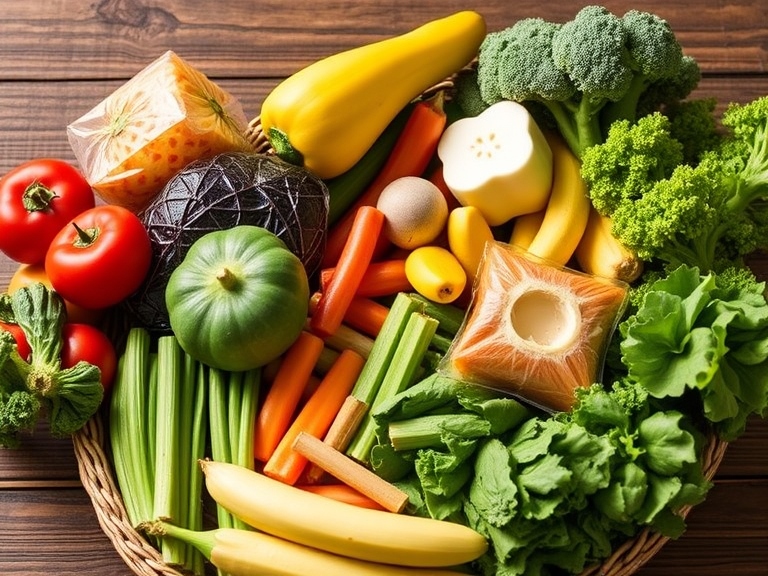What Is Sustainable Weight Loss?
Sustainable weight loss is not about crash diets or quick fixes. It focuses on making gradual, long-term changes to lifestyle and habits that promote health and well-being. Unlike rapid weight loss methods, sustainable weight loss prioritizes consistency over speed, allowing individuals to maintain their weight and health improvements over time.
Why Is Weight Loss Important?
Achieving and maintaining a healthy weight is essential for overall health. Sustainable weight loss can:
- Improve heart health by reducing the risk of cardiovascular diseases.
- Lower the risk of chronic illnesses like type 2 diabetes, hypertension, and certain cancers.
- Enhance mental health, as a healthier body often leads to better self-esteem and mood stability.
For example, a study published in The Lancet Diabetes & Endocrinology in 2016 found that moderate weight loss significantly improved insulin sensitivity and reduced cardiovascular risk factors in overweight individuals.
Current Challenges in Weight Loss
Globally, obesity rates have tripled since 1975, according to the World Health Organization (WHO). In Vietnam, the obesity rate has also risen sharply, particularly among urban populations. Common challenges include:
- Lack of knowledge about healthy eating.
- Sedentary lifestyles.
- Psychological barriers, such as stress and low motivation.
The Core Principles of Sustainable Weight Loss

Creating a Caloric Deficit
Weight loss fundamentally requires burning more calories than you consume. Here’s how:
- Understanding Calories: Calories are units of energy. Your body uses them for basic functions like breathing and movement.
- Ways to Create a Deficit:
- Reduce caloric intake by eating smaller portions or opting for low-calorie foods.
- Increase energy expenditure through exercise.
Eating a Balanced Diet
A nutritious diet is the cornerstone of sustainable weight loss:
- Include Essential Food Groups:
- Proteins: Lean meats, tofu, lentils.
- Healthy Fats: Avocado, nuts, olive oil.
- Complex Carbs: Whole grains, sweet potatoes.
- Vitamins and Minerals: Leafy greens, fruits.
- Prioritize Whole Foods: Avoid processed snacks; instead, choose nutrient-dense options.
- Control Portion Sizes: Use smaller plates or measure servings. For instance, a palm-sized portion of protein and a fist-sized portion of carbs is a balanced meal.
Regular Exercise
Physical activity complements diet for effective weight loss:
- Types of Exercises:
- Cardio (e.g., running, cycling): Burns calories and improves heart health.
- Strength Training: Builds muscle, which increases resting metabolism.
- Yoga/Pilates: Enhances flexibility and reduces stress.
- Plan Your Workouts: For beginners, aim for 150 minutes of moderate-intensity cardio and two strength training sessions per week.
Prioritize Sleep and Stress Management
Poor sleep and chronic stress hinder weight loss.
- Sleep: Studies show that less than 6 hours of sleep per night increases hunger hormones like ghrelin.
- Stress Reduction Techniques: Practice mindfulness, yoga, or meditation to lower cortisol levels, which can lead to fat storage.
1. Emphasize Whole Foods

One of the foundational principles of sustainable weight loss is focusing on whole, unprocessed foods. This means incorporating plenty of fruits, vegetables, whole grains, lean proteins, and healthy fats into your diet. These foods are nutrient-dense and often lower in calories, meaning you can eat satisfying portions without compromising on health. By prioritizing whole foods, you nourish your body and help regulate hunger.
2. Practice Portion Control
Understanding portion sizes is key to managing your calorie intake without feeling deprived. It’s not just about what you eat but how much you eat. Using smaller plates, measuring servings, and being mindful of your food can help prevent overeating. Learning to listen to your body’s hunger cues also plays an essential role in portion control and long-term weight management.
3. Stay Hydrated
Drinking enough water is crucial for overall health and can aid in weight loss. Sometimes, we confuse thirst with hunger, leading to unnecessary snacking. Aim to drink at least 8-10 cups of water daily; this can include herbal teas and other non-caloric beverages. Staying hydrated also supports metabolism and can enhance exercise performance, making your weight-loss efforts more effective.
4. Incorporate Regular Physical Activity

Exercise is a vital component of sustainable weight loss. Finding physical activities you enjoy makes it easier to stick with an active lifestyle. Aim for a combination of cardiovascular workouts, strength training, and flexibility exercises. Regular movement not only burns calories but also boosts your mood and energy levels, contributing to an overall healthier lifestyle.
5. Focus on Behavior Change, Not Just Diet
Sustainable weight loss goes beyond short-term dieting; it is a lifestyle change. Identifying and addressing emotional eating patterns, late-night snacking, or mindless eating can help create lasting change. Keeping a food journal or seeking support through counseling or groups can help you stay accountable and develop healthier habits that endure.
6. Set Realistic Goals
When it comes to weight loss, setting realistic and achievable goals is crucial. Consider aiming for a gradual weight loss of 1-2 pounds per week, which is generally considered sustainable. Celebrate small achievements along the way, whether it’s reaching a fitness milestone or fitting into a favorite outfit. This positive reinforcement helps maintain motivation and commitment to your journey.
7. Prioritize Sleep and Stress Management
Sleep and stress significantly impact weight loss efforts. Lack of sleep can lead to increased hunger and cravings, making it difficult to stick to healthy choices. Similarly, stress can trigger emotional eating. Prioritize a good night’s sleep and explore stress management techniques such as mindfulness, meditation, or yoga to create a healthier balance in your life.
Detailed Weight Loss Strategies

Personalize Your Weight Loss Plan
- Set Realistic Goals: Aim for 0.5–1 kg of weight loss per week.
- Track Progress: Use apps or journals to monitor weight, diet, and exercise.
Build Healthy Eating Habits
- Balanced Breakfast: For example, a bowl of oatmeal topped with banana slices and chia seeds.
- Frequent Small Meals: Eating every 3–4 hours prevents overeating.
- Hydration: Drink at least 8 cups of water daily.
- Avoid Sugary Drinks: Replace soda with green tea or water infused with fruits.
Seek Support
- Share Your Goals: Family and friends can provide encouragement.
- Join Communities: Weight loss groups offer motivation and accountability.
- Consult Professionals: Nutritionists and personal trainers tailor advice to your needs.
The Power of Mindful Eating for Weight Loss
In our fast-paced lives, it’s easy to lose touch with the food we consume. Mindful eating is a powerful strategy to help manage your weight and develop a healthier relationship with food. Here’s how to get started:
- Slow Down: Allocate time to eat without distractions. Put away your phone and turn off the TV. This allows you to focus entirely on your meal.
- Savor Each Bite: Pay attention to flavors, textures, and aromas. Chewing slowly helps the body recognize satiety cues, making it easier to stop when full.
- Listen to Your Body: Learn to differentiate between hunger and cravings. Ask yourself if you’re truly hungry or just bored or stressed. This practice fosters a healthier relationship with food.
- Portion Control: Use smaller plates to help control your portions. It tricks your brain into thinking you’re eating more, which can reduce the chances of overeating.
- Reflect Post-Meal: Take a moment after eating to assess how you feel. Are you satisfied? Did you enjoy your meal? This reflection can help inform future choices.
Incorporating mindful eating techniques can lead to better decision-making around food, ultimately aiding in weight loss and improving overall well-being.
The Role of Hydration in Weight Loss

When it comes to weight loss, hydration often takes a backseat, but water plays a crucial role in the process. Here’s why staying hydrated is essential and how to make it a priority:
- Boost Metabolism: Drinking water boosts your metabolism temporarily. Studies show that consuming 500 ml of water can increase the metabolic rate by about 30% for 30-40 minutes.
- Suppress Appetite: Often, our bodies confuse thirst with hunger. Drinking a glass of water before meals can help you eat less and feel satisfied faster.
- Enhance Exercise Performance: Staying hydrated improves physical performance. Dehydration can lead to fatigue and decreased motivation, making your workouts less effective.
- Flush Out Toxins: Proper hydration assists the kidneys in flushing out waste and toxins, promoting overall health. This can have a positive effect on weight loss as well.
- Flavor it Up: If plain water seems boring, infuse it with fruits, vegetables, or herbs. Experimenting with flavors makes it easier to drink the recommended 2-3 liters daily.
Incorporate these hydration tips into your daily routine and watch how it positively impacts your weight loss journey.
Effective Strategies for Meal Prepping
Meal prepping is an invaluable strategy for anyone looking to lose weight. Not only does it save time, but it also ensures you stay on track with your diet. Here’s how to get started:
- Plan Ahead: Dedicate a day each week to plan your meals. List out recipes that are healthy and nutritious, focusing on balanced plates with proteins, healthy fats, and carbohydrates.
- Grocery Shopping: Stick to your shopping list to avoid impulse buys. Fill your cart with fresh produce, lean proteins, and whole grains to set yourself up for success.
- Batch Cooking: Cook large quantities of healthy meals and portion them into single servings. This way, you have quick, nutritious options ready, reducing the temptation to choose unhealthy takeout.
- Use Proper Storage: Invest in quality containers that are microwave-safe and easy to stack. Label your meals with dates to keep track of freshness.
- Stay Flexible: Allow for some spontaneity. While prep is essential, it’s okay to swap out meals if you’re craving something different. Staying flexible keeps you engaged and motivated.
By dedicating some time to meal prepping each week, you’ll find it easier to stick to your health goals and maintain a balanced diet.
The Importance of Physical Activity for Weight Loss

While diet is a significant factor in weight loss, exercise plays a crucial role in achieving and maintaining your goals. Here are effective ways to incorporate physical activity into your routine:
- Set Realistic Goals: Start small with weekly goals that are achievable. Aim for at least 150 minutes of moderate aerobic activity or 75 minutes of vigorous activity per week.
- Find Activities You Enjoy: Whether it’s dancing, hiking, cycling, or yoga, finding joy in your workout makes it easier to stick with it.
- Mix It Up: Incorporating a variety of exercises—strength training, cardio, and flexibility workouts—keeps your routine exciting and prevents boredom.
- Schedule Workouts: Treat exercise like an important appointment. Block off time in your calendar and hold yourself accountable.
- Stay Active Throughout the Day: Look for opportunities to move more, such as taking the stairs instead of the elevator, walking during breaks, or playing with your kids.
By integrating regular physical activity into your lifestyle, not only will you support your weight loss goals, but you’ll also enhance your overall health and well-being.
Stress Management for Effective Weight Loss
Stress can significantly impact your weight loss journey, leading to emotional eating or unhealthy habits. It’s crucial to develop strategies to manage stress effectively. Here are some tips:
- Identify Stressors: Take note of what triggers your stress. Understanding your triggers allows you to find solutions or coping mechanisms.
- Practice Mindfulness: Techniques such as meditation, deep breathing exercises, or yoga can help reduce stress levels and improve mental clarity. Just a few minutes a day can make a difference.
- Stay Active: Regular physical activity helps to alleviate stress. Exercise releases endorphins, the body’s natural mood lifters.
- Get Enough Sleep: Lack of sleep can increase stress and affect weight loss efforts. Prioritize getting 7-9 hours of quality sleep each night.
- Connect with Others: Build a supportive network of friends or family. Sharing your experiences and feelings can lighten the burden of stress.
Common Mistakes and How to Avoid Them

Over-Restrictive Diets
- Consequences: Nutrient deficiencies, fatigue, and eventual binge eating.
- Solution: Follow a balanced, varied diet. For example, instead of cutting carbs entirely, choose whole-grain options.
Overtraining
- Symptoms: Fatigue, injury, or lack of progress.
- Solution: Alternate intense workouts with rest days.
Losing Motivation
- Reasons: Unrealistic expectations or lack of visible progress.
- Solution: Focus on non-scale victories like improved stamina or better sleep.
Sustainable weight loss is a journey that involves:
- Gradual lifestyle changes.
- A balanced diet and consistent exercise.
- Prioritizing mental health and sleep.
Start small. Replace one unhealthy habit at a time, celebrate progress, and remember that lasting change takes patience. As the saying goes, “It’s not a diet; it’s a lifestyle.”
By adopting these strategies, you can achieve your weight loss goals and maintain them for a healthier, happier life. Why not begin today?



